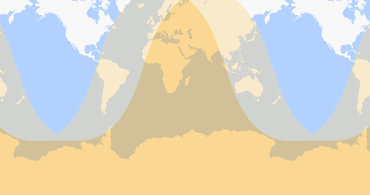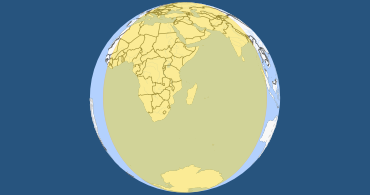Is this transit visible in Columbus?
Where to See the Transit
Try our new interactive eclipse maps. Zoom in and search for accurate eclipse times and visualizations for any location.
Where to See the 2032 Mercury Transit
Regions seeing at least some parts of the transit: Europe, Asia, Australia, Africa, South/East North America, South America, Pacific, Atlantic, Indian Ocean, Antarctica.
Is this transit visible in Columbus?
Who Can See the Transit
Shades of darkness
Night
Astronomical Twilight (Sun is 12 - 18 degrees below the horizon)
Nautical Twilight (Sun is 6 - 12 degrees below the horizon)
Civil Twilight (Sun is 0 - 6 degrees below the horizon)
Day
Entire transit visible
Parts of transit visible (Sun rises or sets during transit)
Transit not visible
When the 2032 Mercury Transit Happens Worldwide — Timeline
Planet transits are normally visible from all locations where the Sun is up. However, because of different viewing angles, the start and end times can vary by a few minutes. The times below are actual times (in UTC) when the transit is visible.
| Eclipse Stages Worldwide | UTC Time | Local Time in Columbus* |
|---|---|---|
| First location to see the partial transit begin | Nov 13 at 06:40:09 | Nov 13 at 1:40:09 am |
| Geocentric** partial transit begins (ingress, exterior contact) | Nov 13 at 06:41:01 | Nov 13 at 1:41:01 am |
| First location to see the full transit begin | Nov 13 at 06:42:14 | Nov 13 at 1:42:14 am |
| Geocentric** full transit begins (ingress, interior contact) | Nov 13 at 06:43:05 | Nov 13 at 1:43:05 am |
| Mercury is closest to the Sun's center | Nov 13 at 08:54:11 | Nov 13 at 3:54:11 am |
| Geocentric** full transit ends (egress, interior contact) | Nov 13 at 11:05:21 | Nov 13 at 6:05:21 am |
| Last location to see full transit end | Nov 13 at 11:06:12 | Nov 13 at 6:06:12 am |
| Geocentric** transit ends (egress, exterior contact) | Nov 13 at 11:07:25 | Nov 13 at 6:07:25 am |
| Last location to see partial transit end | Nov 13 at 11:08:16 | Nov 13 at 6:08:16 am |
* These local times do not refer to a specific location but indicate the beginning, peak, and end of the eclipse on a global scale, each line referring to a different location. This transit isn't visible in Columbus.
** The geocentric times refer to a theoretical situation where the transit is viewed from the Earth's center. They are used to provide an approximately average time schedule for astronomical events. Because of varying perspectives, observers on the Earth's surface will experience the transit at slightly different times depending on their location.
Geocentric duration of this Mercury Transit is 4 hours, 26 minutes, 24 seconds.
Transits and eclipses visible in Columbus

